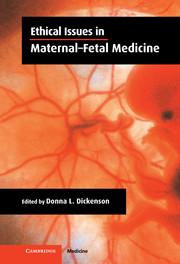Book contents
- Frontmatter
- Contents
- List of contributors
- Acknowledgements
- 1 Introduction: recent debates in maternal–fetal medicine – what are the ethical questions?
- 2 Overview: a framework for reproductive ethics
- I GENERIC ISSUES IN PREGNANCY
- 3 Multicultural issues in maternal–fetal medicine
- 4 HIV in pregnancy: ethical issues in screening and therapeutic research
- 5 Genetic screening: should parents seek to perfect their children genetically?
- 6 Is there a duty not to reproduce?
- 7 Between fathers and fetuses: the social construction of male reproduction and the politics of fetal harm
- 8 Restricting the freedom of pregnant women
- II INCEPTION OF PREGNANCY: NEW REPRODUCTIVE TECHNOLOGIES
- III FIRST AND SECOND TRIMESTER
- IV THIRD TRIMESTER
- V NEONATAL LIFE
- Index
7 - Between fathers and fetuses: the social construction of male reproduction and the politics of fetal harm
from I - GENERIC ISSUES IN PREGNANCY
Published online by Cambridge University Press: 29 September 2009
- Frontmatter
- Contents
- List of contributors
- Acknowledgements
- 1 Introduction: recent debates in maternal–fetal medicine – what are the ethical questions?
- 2 Overview: a framework for reproductive ethics
- I GENERIC ISSUES IN PREGNANCY
- 3 Multicultural issues in maternal–fetal medicine
- 4 HIV in pregnancy: ethical issues in screening and therapeutic research
- 5 Genetic screening: should parents seek to perfect their children genetically?
- 6 Is there a duty not to reproduce?
- 7 Between fathers and fetuses: the social construction of male reproduction and the politics of fetal harm
- 8 Restricting the freedom of pregnant women
- II INCEPTION OF PREGNANCY: NEW REPRODUCTIVE TECHNOLOGIES
- III FIRST AND SECOND TRIMESTER
- IV THIRD TRIMESTER
- V NEONATAL LIFE
- Index
Summary
In contemporary American political discourse ‘crack babies’ have been treated as filius nullius – as if they had no biological fathers. With no link between fathers and fetuses, no inheritance of harm could be attributed to the father's use of drugs. The absence of fathers in debates over drug addiction and fetal harm has had profound consequences for women, for it has dictated that women alone bear the burden and blame for the production of ‘crack babies’.
Since at least the late 1980s, and in some cases far earlier, studies have shown a clear link between paternal exposures to drugs, alcohol, smoking, environmental and occupational toxins, and fetal health problems. Yet men have been spared the retribution aimed at women. In fact, while women are targeted as the primary source of fetal health problems, reports of male reproductive harm often place sperm at the centre of discourse as the ‘littlest ones’ victimized by reproductive toxins, somehow without involving their male makers as responsible agents.
Scientific research linking reproductive toxins to fetal health problems reflects deeply embedded assumptions about men and women's relation to reproductive biology. Critical analysis of the nature of fetal risks thus requires not only examination of the biology of risk, but also assessment of what Evelyn Fox Keller has called the ‘collective consciousness’ that fundamentally shapes scientific inquiry on gender difference – a consciousness that is constituted by ‘a set of beliefs given existence by language rather than by bodies’ (Keller, 1992: p. 25).
- Type
- Chapter
- Information
- Ethical Issues in Maternal-Fetal Medicine , pp. 113 - 130Publisher: Cambridge University PressPrint publication year: 2002
- 3
- Cited by



